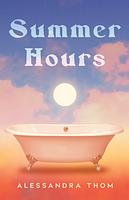Looking for all Articles by Alessandra Thom?
Five top tips for adapting a short story into a novel
Former New Writers Awardee and recently published author Alessandra Thom shares her top tips for adapting a short story into a novel.

The step from writing short stories to novels can seem insurmountable. Writing a short story of a few thousand words is vastly different from a novel of tens or hundreds of thousands. If a short story is a drop of water, a novel is the loch it falls into. But if you can write a short story, you can write a novel. All the elements, though different, are there: building suspense, developing character, creating a compelling plot and a vibrant setting, utilising themes and motifs.
I wrote my first novel by taking a short story I’d already written and adapting it. Here are my five top tips to help you do the same.
Read, re-read, then read again
Read your short story from beginning to end, then read it again. If you can, print it out so you don’t fall into editing it. Go over it with a pen, or add comments on your computer, highlighting moments you think are intriguing. These could be moments where it’s evident you’re only seeing one side of a character, or moments where there is a plot door open that your characters don’t walk through, or simply moments that make you feel something.
You’ll learn what kind of novel you want to write by discovering what resonates with you, and what opportunities excite you.
Question everything
Is your short story the beginning of your novel? Is it the end? Did the events of the short story take place long ago? Or did the events of the short story take place in the future, and you want to travel back in time to see how they got there? Or do you want to take the characters and pretend the short story never happened? What would their lives look like if it had never come to pass? What would the same plot look like with different characters? What would the same characters look like with a different setting? What would happen if one character had never met the other? What would happen if none of the characters had ever met before? What would happen if they hated each other, or fell in love, or were stuck in a car together?
Ask yourself lots of questions, take lots of notes, get outside into the fresh air and think about it. Write everything down.
Sketch it out
Whether you’re extending a short story, or taking inspiration from it, you will need to work on expanding the plot and the characters. A nice way to explore this is by writing little vignettes, scenes, or stories (using the plot, setting, or characters) which don’t need to make it into the book. How would this character behave in that situation? What would happen to the plot if someone went left instead of right?
Donna Tartt talks about using her notebook like an artist uses a sketchbook. Practice makes perfect. You’ll learn so much about a character, or a setting, or a subplot, by sketching it out. No perfectionism allowed.
Pace yourself
A short story is at most, probably only a few scenes. A novel’s story must be sustained over a longer period of time, so adjusting your pacing will take some getting used to. Allow your characters time to have full conversations, to fully take in their surroundings, to feel uncomfortable before becoming comfortable (or vice versa), to explore every avenue, meet every person.
If it helps, map out the novel’s beats and the scenes in between. Using traditional story arcs can help with this, like the three or five-act structure. Remember, though, to leave plenty of breathing space. There is no one way to tell a story.
Explore and play
Think of a novel as a wide, open field – there is so much to explore. Every path you take can lead to another three paths. With a short story, you have to focus on one or two elements of the plot or a single moment or feeling. With a novel, you have the space to explore much further. Writing is fun; allow yourself the space to play. Enjoy it!

Alessandra's debut novel Summer Hours will be published by Polygon on 19 June and is available to pre-order now(this link will open in a new window).